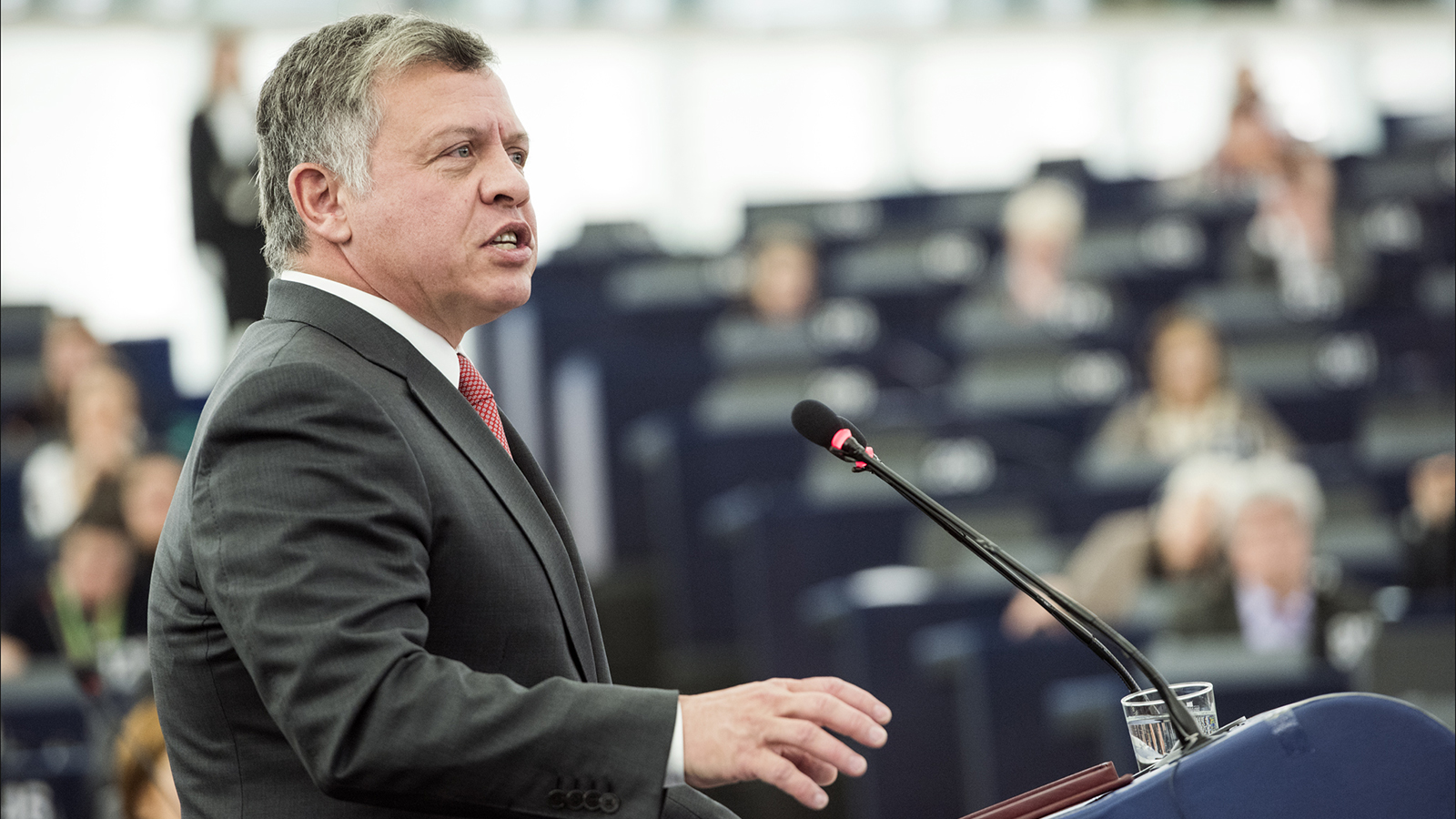
King Abdullah II of Jordan addresses the European Parliament on March 10, 2015. (Pietro Naj-Oleari/European Parliament/Creative Commons)
King Abdullah II of Jordan has won the 2018 Templeton Prize for promoting dialogue and cooperation between Muslims of differing traditions.
Abdullah, king of Jordan since 1999, "has led a reclamation of Islam's moderate theological narrative from the distortions of radicalism," the John Templeton Foundation said Wednesday (June 27). The annual prize honors "a person who has made an exceptional contribution to affirming life's spiritual dimension, whether through insight, discovery, or practical works," the foundation said in a statement.
Among Abdullah's contributions to religious understanding is his 2004 "Amman Message," which "articulated a clear understanding of the central elements of Islam, and affirmed that terrorism and violence have no place in the religion," said the foundation.
That message, developed when the Iraq War worsened relations between Sunni and Shiite Muslims, was expanded the next year when the king invited 200 Islamic scholars from 50 countries to Jordan. From those consultations emerged "Three Points of the Amman Message," which recognized the validity of all eight of Islam's legal schools and explicitly forbade declarations of apostasy, the foundation said.
Abdullah has also been a strong supporter of the Royal Aal al-Bayt Institute for Islamic Thought, in Amman. The institute, established by Abdullah's father, King Hussein, promotes scholarship with the aim of fostering understanding and cooperation among Muslims.
In 2007, the king advocated for and funded an initiative called "A Common Word Between Us and You," in which Muslim leaders addressed their Christian counterparts, calling for cooperation between the two religions based on the shared traditions of love of God and love of neighbor.
From that initiative came a 2010 proposal at the United Nations: World Interfaith Harmony Week, which the U.N. now marks during the first week of February "to stress the moral imperative of promoting and understanding the values of peace inherent in all religions," the foundation said.
In conjunction with the commemoration, the U.N. General Assembly unanimously passed a resolution "expanding the twin 'love' commandments by adding 'love of God or love of the good' to 'love of one's neighbor,'" the foundation noted. "It is generally acknowledged as the first and only time that the United Nations approved a resolution explicitly citing belief in God."
These and other efforts have "come with great personal cost including condemnation and death threats from radical terrorist groups," the foundation said. "As a result of Jordan's key geographical location, (the king's) efforts have required extraordinary courage to advance cooperation within Islam and between Islam and other religions."
Abdullah is the second Muslim to win the Templeton Prize. Inamullah Khan, founder of the Modern World Muslim Congress, was the first, in 1988.
In a videotaped message released by Templeton, Abdullah said the world "needs to confront challenges to our shared humanity and values."
"They are the very ground of the coexistence and harmony our future depends on. And this is why I feel it is so urgent to promote tolerance and mutual respect, support inclusion and hope, speak out against Islamophobia and other wrongs, and make our values a real force in the daily life of the modern world."
The king is a member of the Hashemites, Jordan's royal family, and a direct descendant of the Prophet Muhammad. Abdullah was also praised for making Jordan a place of welcome for refugees fleeing war and conflict in the Middle East and for taking a lead role in Jordan's protection of Christian and Islamic holy sites.
Advertisement
Heather Templeton Dill, the foundation president and the granddaughter of Sir John Templeton, the global investor and philanthropist who founded the prize in 1972, called Abdullah's work "inspiring."
"He has underscored the importance of Islam's diversity rather than seeking to invent or enforce uniformity where none exists," Dill said in a statement. "He has built upon the power of principled pluralism to extend religious harmony among the 1.8 billion followers of Islam, the world's second largest religion, so that each can recognize one another as Muslims."
Noting that her grandfather "often used the phrase 'spiritual entrepreneur' to describe Templeton Prize laureates," Dill said, "King Abdullah offers the world the true definition of a spiritual entrepreneur, a person shaped by temporal and political responsibilities, yet who holds both the belief and free expression of religion as among humankind's most important calling."
The Templeton Prize is valued at 1.1 million British pounds, or about $1.4 million, one of the largest individual prizes in the world.
The king joins a distinguished group of Templeton laureates, including Mother Teresa, Alexander Solzhenitsyn, Billy Graham, Desmond Tutu and the Dalai Lama. The 2017 Templeton laureate was American scholar Alvin Plantinga, a pioneering advocate for theism as a serious philosophical position within academic circles.
Abdullah will formally receive the prize in a public ceremony in November in Washington, D.C.




